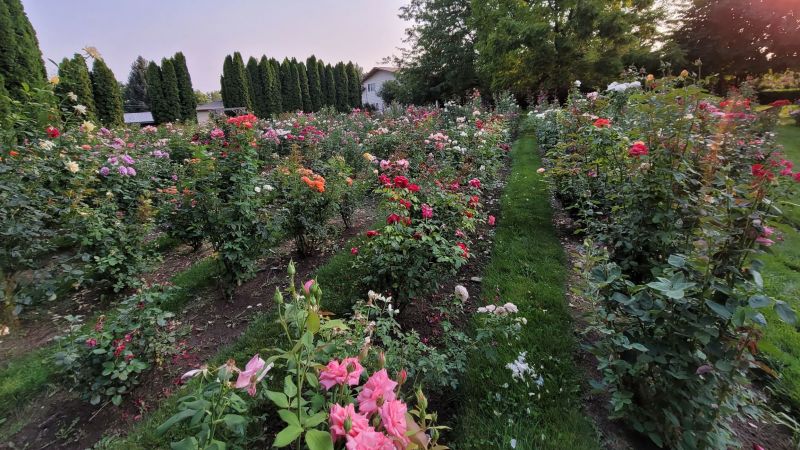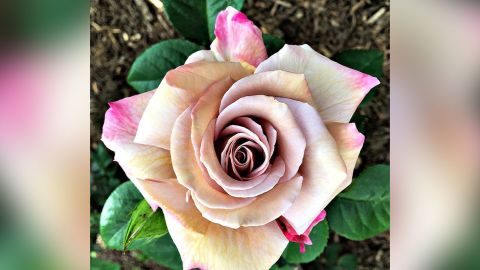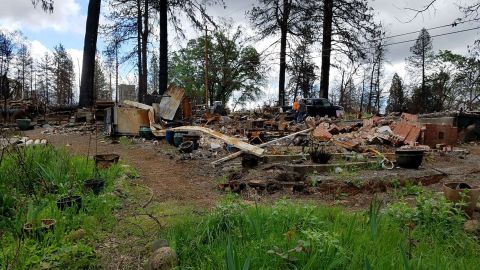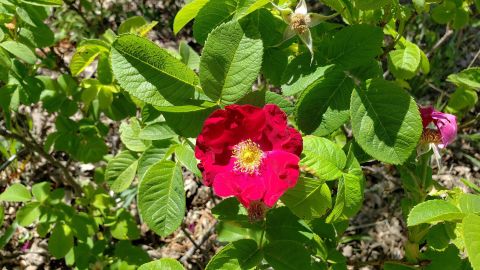
CNN
—
When you think of roses, you may not think of them as rare. You can easily find commercially grown roses at your local florist or even at the grocery store.
But when it comes to unique heritage roses, there is a world of collectors and preservationists working hard to keep them alive amid numerous challenges including commercial trends, disease, pests and climate change.
Last weekend, a group of collectors gathered in Southern California to bid on some of the rarest roses in the United States. Many roses on the auction block are no longer available commercially – some were being offered for the first time in the US.
This year’s most sought-after rose was “The Iron Throne,” which sold for $350. “It is special because it is not available commercially and is a unique color combination,” said John Bagnasco, president of the California Coastal Rose Society and co-chairman of the Save the Roses! project.

The society’s annual auction, which Bagnasco noted has been around for 22 years, is one of the ways private collectors are helping keep some roses from extinction.
Gardeners have always been at the mercy of weather, but recent drought conditions, water shortages and wildfires have impacted certain gardens across the country.
“Climate change makes it tougher to grow roses,” said Steve Singer, owner of Wisconsin Roses. Heat exacerbates the presence of spider mites and other insects, and roses need a lot of water to grow, he explained.
Beth Hana knows firsthand about the damage wildfires can do to roses. Hana moved to Paradise, California, in 1989 and her garden had some 1,800 roses before 2018’s Camp Fire broke out.

The fire – the deadliest and most destructive in California history – burned Hana’s family home, along with her robust garden, which included some “really rare” roses. Hana is now rebuilding the garden at her new home in Los Molinos, California, relying on the less than 800 roses she was able to save, along with other additions. The garden has grown to more than 1,500 roses, but most are potted, rather than rooted in the earth.
“It’s going to take years to get them in the ground,” she said.
Several private gardeners don’t just grow rare roses – they are also helping keep preserve them by exchanging them with other collectors.
“If we think we are the only owner we try to get them in the hands of another,” said Dianne Wiley, a private gardener in Idaho. “If we lose (a variety), then it could be gone forever.”
Wiley, who is growing some 1,400 roses, said she has a few duplicates, but most are of different varieties – and many are rare finds.

In some cases, private gardeners and collectors help connect people with roses they are especially seeking out. John Millar, proprietor of Newport House Bed and Breakfast in Williamsburg, Virginia, reached out to Bagnasco about the Joanna Millar rose, named after his now 92-year-old stepmother.
“I had the only one in the country and was able to send him a started plant,” Bagnasco said.
Having the plant means a great deal to Millar, who said he thinks “the world” of his stepmother and noted that having this rose would mean having “her live forever with us.”
Many times, a rose becomes extinct simply because it’s no longer trendy or in vogue. A rose could have been very popular at one time, explained Art Wade, co-owner of Rose Petals Nursery in Newberry, Florida. “But then, like with many fads, that particular rose, kind of waned and another one came in its place.”
Most roses, with some exceptions, are developed and sold until the popularity of that rose fades.
“Rose companies stop selling roses when sales drop and they go extinct,” said Singer. “Every year there are new roses developed” and “there are only so many you can carry.”
But there are roses that make it back from so-called extinction. One example is the “Arnold” rose, which was introduced to the public in 1893 and named in honor of Harvard University’s Arnold Arboretum, where the rose’s creator worked.
In July 2015, an article published in the arboretum’s quarterly magazine addressed the history of the rose and how the arboretum was looking for “healthy, correctly identified specimens of ‘Arnold.’”
Thanks to someone who was at a 2017 lecture delivered by the article’s author, the Arnold was found again.
Anita Clevenger, vice president of the Heritage Rose Foundation, recalled being in the garden of some rose collectors in Santa Rosa, California, when she noticed a “garnet-red rose that looked familiar.”
“I read the tag, and it was ‘Arnold,’” she said. “We were able to trace the provenance sufficiently to believe that it was indeed Arnold.”

The rose was eventually propagated for distribution to collectors and nurseries. The Arnold can now be purchased commercially in the US. As of late October, it is also back at the Arnold Arboretum, confirmed Michael S. Dossman, keeper of the living collections at the arboretum.
“This is incredibly exciting, and it has been a long time coming,” he said.
“It is really difficult to save history and things that are alive,” said Gregg Lowery, curator for The Friends of Vintage Roses, a California-based nonprofit that aims to preserve and share a collection of close to 4,000 varieties and species of rare roses.
Lowery pointed out that individual collectors, nursery collections and institutional collections, which belong to botanical gardens, are three ways in which roses have been preserved in the past.
As Bagnasco noted: “If gardeners don’t do it, who will?”
